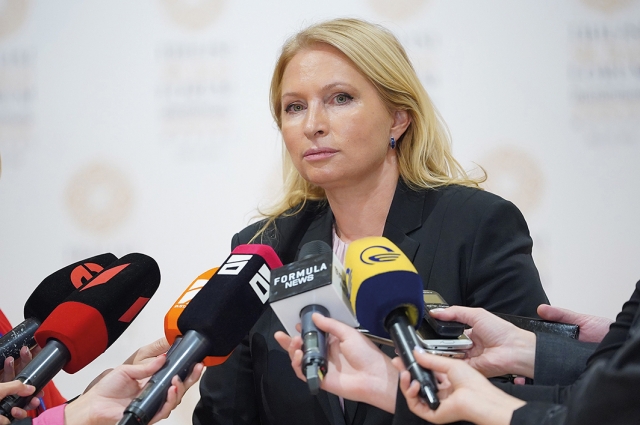Minister Turnava on the Tbilisi Silk Road Forum 2019
Exclusive Interview
GEORGIA TODAY asked the Minister of Economy and Sustainable Development of Georgia, Natia Turnava, to share her impressions of the 2019 edition of the Tbilisi Silk Road Forum, which saw 2000 delegates from 60 countries in attendance.
What are the deliverables of the Tbilisi Silk Road Forum? What was its impact?
This edition of the Silk Road forum was different from the previous two that I attended, though then I was not as a member of the government. A marked distinction is that whereas during the previous forum the talk of the day evolved around future plans and investments, today the domineering narrative was foreign investment funded by private businesses that proved to be a success. And they were eager to share their experience and the know-how with their potential colleagues and investors: What made their success possible, why they decided to invest, what plans for enlargement they have, why they opted for Georgia instead of other frontier markets.
It was a very inspiring thing, because if earlier it fell to us the government to convince the business sector it was worth their time and resources to invest here, now we can see it obviously bore fruit and the business sector itself is raising its voice. This is a marked success not only of this edition, but of the Silk Road Forum concept in general.
However, this latest edition still managed to stand out as it was attended by a record number of 2000 participants from 60 different countries, and saw a host of bilateral meetings organized. Panel discussions are incredibly important to raise awareness about a country and its business environ; to find ways to solve regional challenges, but bilateral meetings are where deals are brokered and decisions are made, contracts are signed and so on.
And we discussed a great many projects during these bilateral meetings. For example, several Chinese business groups that plan to invest here advanced their projects further, a high-ranked Uzbek delegation, headed by their Vice Prime Minister, visited the Black Sea coast to choose specific locations, be it Poti, Anaklia or someplace else, where they plan to build and develop terminals and other logistical projects. This clearly showcases that the Uzbek businesses are trying to find a corridor to other markets and view Georgia as a strategic partner. Railway delegations from several countries organized working meetings here, where they discussed important matters such as preferential customs duties and so on.
Our corridor has distinct advantages: it is short, stable and safe and allows access to many neighboring countries. The challenge is that this corridor has so many participant countries in it, meaning it has to cross so many borders, so if it wants to compete and claim an advantage over alternative routes, it becomes really vital that everyone is on the same page, that everyone agrees to the same framework, to the same liberalization of tariffs and so on.
Afghanistan, being one end of Lapis Lazuli corridor, sent its Transport Minister to attend the 2019 forum, who discussed the means to improve the situation for drivers. Another important matter that was thoroughly discussed was digitalization of these corridors. It has become increasingly prominent and Georgia is trying to champion the course. An artificial intelligence panel was introduced at the Forum for the first time. While some other countries are discussing how to get rid of bureaucracy in regards of awarding certificates, tickets, custom checks and so on, we are already making advances towards making it all paper-less and fully digital. This endeavor is heartily supported by our partner countries as well, including for example, Ukraine, which is a hugely important access point for our corridor.
Given that the mission of the Forum was to attract more investments to the country, what would your sales pitch be for Georgia, as a minister?
I would focus on themes that have actual impact and influence on how investors make their decisions. The most effective and potent message I have is that we are a country where it is easy to do business. In terms of ease of business, we are both top reformers and top performers. And this is the line that really sells. The complex bureaucracies around founding a new business? We’ve already forgotten what that means: here, in Justice House, you can sort it out in just one hour. Another important incentive is that Georgia is one of the least tax-burdening countries. We have only six types of tax. Add to that the fact we are safe and macro-economically stable; we have a stability that means you shouldn’t expect surprises, and business usually isn’t really fond of surprises; they prefer a stable environment. We’re dynamically growing and stable in this growth as well: despite lots of regional shocks, our economy withstood it and we remained a healthy and stable country. And we offer high profits in return for their investments.
And what are the main challenges?
Business wants more predictability in reforms and we’re well aware of that and are working to accommodate. Another challenge would be the region itself. Georgia is liberal, open to the wide global world, well integrated in the world and regional value-chain, which means that every challenge that the region has takes its toll on us as well. Maybe not so overwhelmingly as in other places, though, as thanks to our macro-economic health, our economy is able to withstand regional shocks. Geopolitically, every political or economic problem has an effect on Georgia as well. But I am happy to say that despite this difficult geopolitical landscape, we are still considered an island of stability. Georgia is on the shortlist of international investors, and every sign points to the fact that the numbers of such investors are growing.
By Vazha Tavberidze












